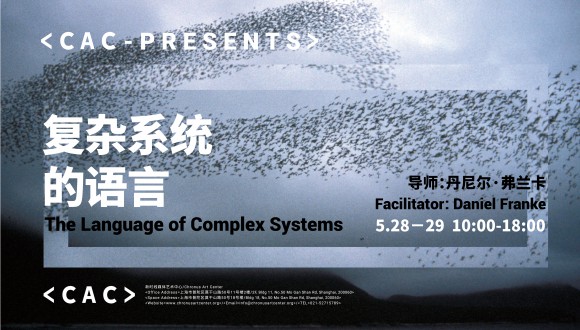Workshop|The Language of Complex Systems
Time:10:00-18:00, 28/5/2016; 11:00-18:00, 29/5/2016
Facilitator:Daniel Franke
Language: English
Venue: Chronus Art Center
Address: Building 18, No 50 Moganshan Road, Shanghai
This workshop is free, APPLY.
- Introduction
In the last years a new understanding of the mechanism of complex systems, with the help of ever more computational power, is driving the development and the use of simulations in almost every realm to a new extent.
This urgency sets the research on simulation at the center of a media-philosophical investigation, asking if it represents a current reasoning style?
Thus the object of the Workshop is a two-sided approach. First a theoretical introduction of complex processes that are constituting nature (organic, non-organic) by turning the virtual into the actual. Second, through practical experiments, the participants will examine new sets of artistic tools that are adopted from these principles.
- Conceptual Framework
How can we perceive complexity?
The workshop emerges from this question, to theoretically explore an understanding of Nonlinear Dynamic Systems (NDS) and complex self-organizing structures. Out of this understanding, together with the participants, I will explore synthetical uses of these principles through simulation, which in turn can be used as artistic tool.
It will be based on Manuel De Landa’s works in combination with Gilles Deleuze’s materialist concepts of morphogenesis based on multiplicities. Throughout the workshop the participants will be introduced to current as well as early applications of simulation, starting from Cellular Automaton and Genetic Algorithms to Neural Networks and Multiagents. To simulate such systems, an understanding of the principles behind is needed. Thus by following a short History of Simulation the participants will also gain knowledge about the mechanisms that are constituting complex systems.
The second aspect of the Workshop is the development of an artistic project out of these principles. For that the participants will be ask to envision a concept for a work out of them.
The focus of the workshop is theoretical and conceptual. We will discuss Simulation not in a technical sense but based on its Media/Philosophical implications and its importance for the arts.
- Requirements
The workshop will be instructed entirely in English. If you don’t feel comfortable with English it is recommended to come with someone who helps you translate.
There are no special requirements except for a deep interests in Media Art and Philosophy, some backgrounds and knowledge in these fields as well as an interest in a non-practical and active role in the development of artistic projects. Artists are very welcome!
- Course Program
DAY-1
10:00 – 11:30 Introduction (Daniel Franke, Complex Systems)
11:30 – 13:00 examples of simulations (theoretical, artistic) will be introduced Part 1 (Celluar Automaton, Genetic Algorithm)
13:00 – 14:00 lunch break
14:00 – 15:30 examples of simulations (theoretical, artistic) will be intrduced Part 2 (Neural Networks, Multiagents)
15:30 – 16:00 coffee break
16:00 – 18:00 in group discussion each participant will develop an idea for a project that utilizes a principles of the introduced complex systems.
DAY-2
11:00 – 13:00 each participant further develops his/her idea with conceptual assistance by Daniel Franke
13:00 – 14:00 lunch break
14:00 – 15:30 each participants shortly introduces her/his idea to the group
15:30 – 16:00 coffee break
16:00 – 18:00 group discussion
- Resources
Manuel De Landa
Philosophy and Simulation: The Emergence of Synthetic Reason
(Chapter: 1, 2, 4, 7, 8)
Facilitator’s Biography
Daniel Franke (b. 06.09.1982) is an artist, curator and researcher currently living and working in Shanghai. He studied Visual Communication and Media Art at the University of the Arts Berlin and completed his master thesis studying under Joachim Sauter and Alberto DeCampo in 2011.
He is also one of the founders of LEAP (Lab for Emerging Arts and Performance), a non-profit interdisciplinary project for emerging, digital media and performance arts that aimed to initiate the dialogue between art, science and technology.
In his own work he questions our understanding of the digital, aiming to view it in the context of a physical perception in the field of animation. He thereby transforms practises known from classical animation into tangible expressions in the “real”, factual and bodily world to explore and visualise complex coherences.

